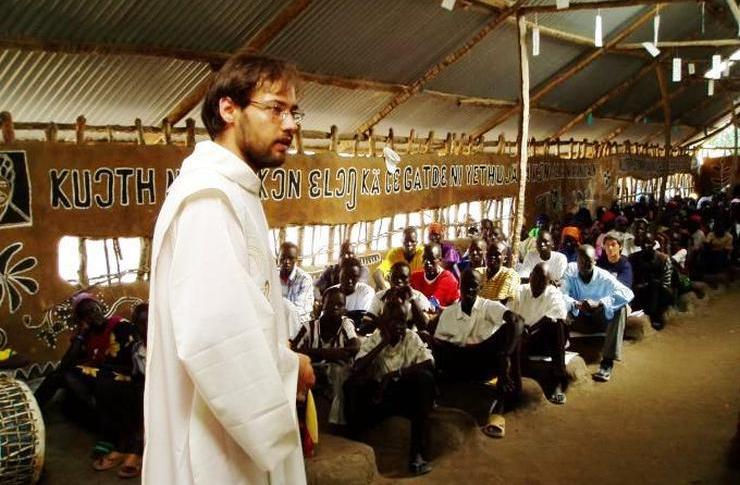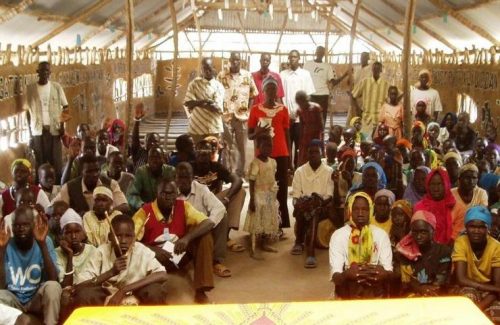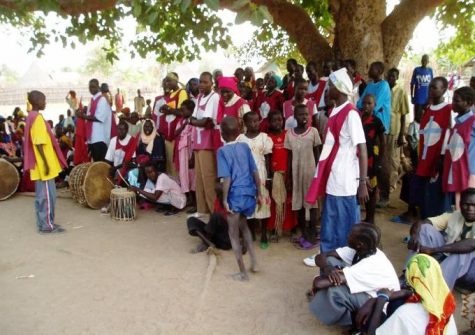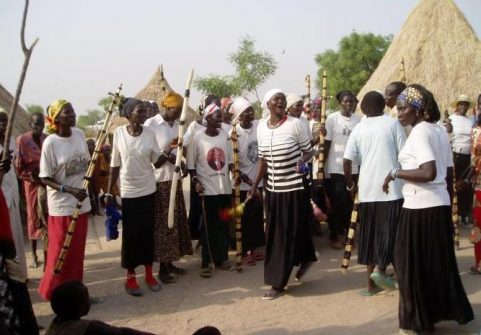Sudan. Mission among the Nuer.

Comboni Missionaries have been living with the Nuer people for almost twenty five years. They have been entrusted with the pastoral care of Saint Joseph the Worker’s Parish in Leer, which is under the Diocese of Malakal. This parish comprises four counties: Leer, Mayiendit, Panyijiar and Koch all within Unity State. Their pastoral priorities: formation of leaders, education, youth and women.
The Nuer or Ney ti Naath, which is translated as ‘the people among peoples’, number approximately two million, spread out in a federation of sections and clans in Unity State (Bentiu), in Jongley State (Fangak and Akobo) and in Upper Nile (Nassir).
Their lifestyle has been adapted to the periodic flooding and dryness of the land. The permanent villages and settlements of the rural Nuer have mud and thatched huts with larger buildings housing the cattle and other livestock, located above the maximum flood level, to which the Nuer return during the rainy season and where they plant their crops.
A typical settlement includes several extended families and other compounds. Bricks or any other permanent material buildings are
rarely to be found.
The Nuer way of life is based on the extended family in which a man is the head of the family. Their political organization is based on kinship, which consists of families and further sub-divisions by lineage and has no central form of government. At times the tribes organize themselves into loose federations. The lineages are a major structural factor for political order. The territorial groupings and lineage groupings are more closely aligned for some particular purposes.
Nuer mostly live in the swampy areas of the former Upper Nile Provincial region. The influence of the environment on the lifestyle of the Nuer is obvious. They are sedentary (although individual families live in solitary settlements) and agro-pastoralists who manage to balance subsistence agriculture with cattle herding and fishing. Their economy is based on livestock and crops production such as sorghum and few other crops. However, some few people have recently started doing business as merchants in the local markets.
Ecclesial context
The first Catholic attempt towards the evangelisation of the Nuer had been made back in 1925 with the foundation of the mission of Yoinyang, now Rubkona, on the northern part of the Bahr El Ghazal River. It was.an important logistic station for the mission of Bahr El Ghazal and a link towards the Nuer.
The presence of the Catholic Church in Leer dates back to the eighties.
Prior to that time, the whole area had been entrusted by the British colonisers to the Protestants (American Protestant Mission) through the ‘Missionary Act’ that created the Mission Spheres (1905).
This allowed the Presbyterians to be established all over and to form the Protestant mission territory until the establishment of the Catholic mission. In this context their Protestant/Presbyterian background still affects their life style a lot.
The beginning of the Catholic Christian Movement amongst the western Nuer took place in the eighties and was led by young Nuer common lay people, later on called catechists. It developed during the time of the war when these catechists founded many Christian communities around and baptised many people. Amongst these catechists was James Duol Kai, considered to be the founder of the Catholic Church in Unity State. Their work (1984-1993) was fundamental in the establishment of the Catholic Church amongst the Nuer. As far as we know, these inspired leaders became the first group in South Sudan that took up the work of evangelisation as we understand it in the Catholic Church.
In 1993 the catechists who worked hard for the establishment of the Catholic Church in the Nuerland felt it was important to ask for the presence of priests among them. A representative of two of them went to Nairobi to ask for ordained ministers. As a result, in 1996 a first group of Comboni Missionaries (MCCJ) came to Leer and established the mission. Since then, this young Church has developed much and grown stronger in faith and understanding of the Christian ethics. Some values were already part of the Nuer culture. Some social institution such as family life and marriage have still to mature a new understanding: polygamy is still widespread and appreciated in this culture.
The area has suffered during time of conflict and people had to move away to seek for safety. In 1998, missionaries had to abandon Leer and move with the people to Nyal after the attacks perpetuated by the the militia of late general Paolino Matip. Missionaries moved back to Leer in 2007. In 2014, Leer was attacked by government troops in the attempt to disperse opposition forces loyal to the opposition leaders Riek Machar. Missionaries were caught by surprise. They were attacked and had to run for their life.
They remained for weeks hidden in the swamps with the people before being evacuated by the UN.
Then, the missionaries moved to Nyal where they continued to offer pastoral care to the population which was victim once again of the conflict and violence.
Formation of leaders & Education
Formation of the pastoral agents is a priority of our missionary endeavour among the Nuer. In 2004 the parish catechetical centre ‘James Duol Kai’ was inaugurated in Nyal with a nine-month programme for the preparation of new catechists. James Duol Kai is a pioneer Nuer catechist who died in a crossfire in 1994 during the war. The formative programme continued in Leer up to 2014. The parish counts over three hundred catechists and lay pastoral agents. In May 2020, the missionaries plan to resume the programme in Leer to bring together the catechists in the main centre of the parish to witness the commitment of the Church for peace and reconciliation. Much violence occurred here in Leer during the latest conflict.
The ‘formation of the catechists’ is the approach and apply the see-judge-act methodology. In communion with the objectives of the parish pastoral plan, the teaching programme covers the Bible, Liturgy, Sacraments, Catechesis, Church History, the Social Teaching of the Church and other relevant areas and topics according to specific needs.
Missionaries are mostly engaged in pastoral work as the vastness of the parish demands a lot of commitment to visit all centres covering long distances on foot.
In Nyal missionaries collaborated with the local community primary school and also promoted the first classes of the secondary school. The Catholic Church was running a nursery school in Leer and supporting other village kindergartens. In Leer missionaries also promoted a Vocational Training Centre (VTC). The VTC offered technical skills on agriculture and animal management. Besides this, the students also acquired a basic knowledge in Mathematics, English, CRE and Entrepreneurship. The centre was plundered and was closed in 2014. During its three years of activities, it contributed to the formation of hundreds of students. There is hope that the project will be taken up again once there is peace and security in the country
Youth & Women ministry
The majority of people in our parish are youth. We are trying to offer pastoral accompaniment to teenagers through a systematic formative programme which includes the Bible, JPIC and other relevant youth issues. The women’s ministry deals with the organised and non-organised women groups of the parish.
It fosters women’s promotion through Christian formation (e.g. Bible study, shared prayer, etc.), education (basic literacy) and better sharing in the decision making process, considering their marginalization in the Nuer society. It aims also at helping the women to improve the quality of their life in some practical skills (e.g. sewing and agriculture). The main challenges faced are illiteracy and the lack of constancy of the of the women due to their many commitments in the family.
Christian Carlassare








